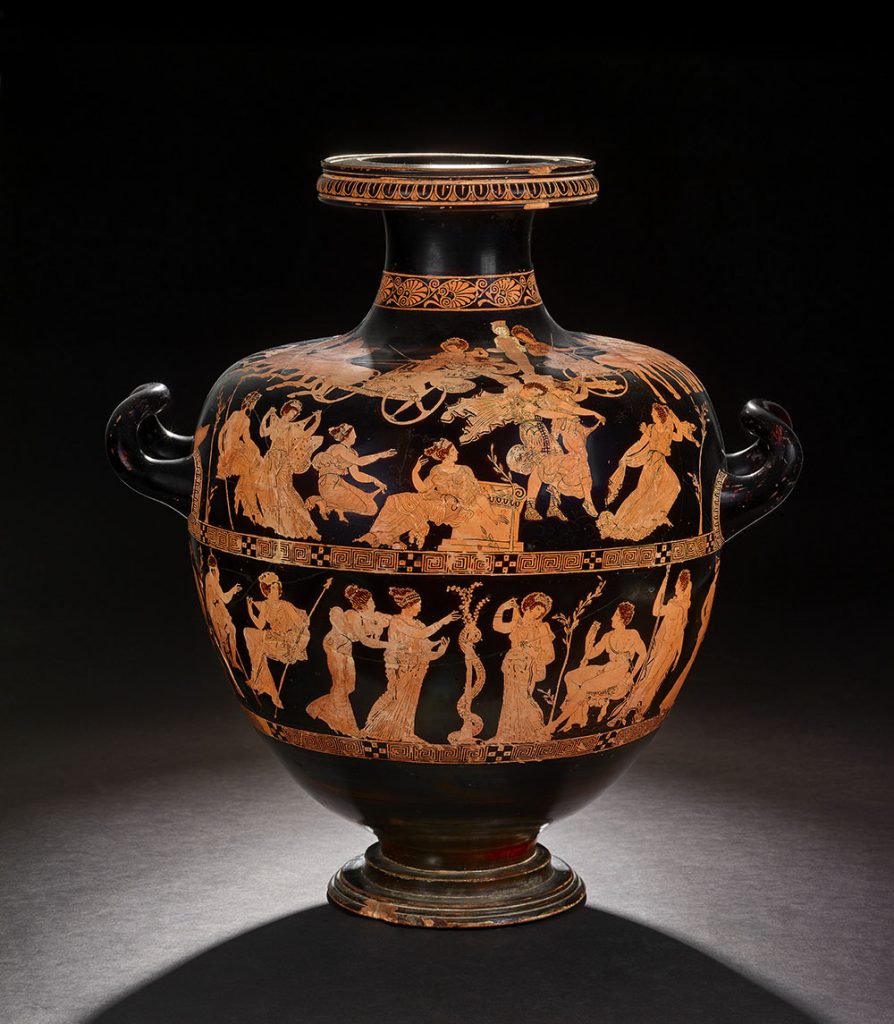Museums & Institutions
A Greek Vase From the British Museum Heads to Athens Amid Parthenon Marbles Debate
Chairman George Osborne revealed plans for a special exhibition of objects stolen from the British Museum.

Chairman George Osborne revealed plans for a special exhibition of objects stolen from the British Museum.

Jo Lawson-Tancred

The British Museum is lending an ancient Greek water vase known as the Meidias Hydria to the Acropolis Museum in Athens for a temporary exhibition. The news comes just a week after the museum’s chairman George Osborne expressed hope of coming to an agreement with Greece over the Parthenon Marbles, which were removed from the Acropolis by Lord Elgin in the early 19th century. Osborne has previously advocated for a “cultural exchange,” which would take the form of a long-term loan of these prized pieces to Greece’s dedicated Acropolis Museum.
Last week, Osborne outlined his idea of a mutually beneficial relationship that would see the Parthenon sculptures moved to Athens while “other treasures from Greece, some that have never left those shores” are loaned to the British Museum. So far, Greek politicians have been resistant to the idea of receiving the marbles as a loan because Greece does not acknowledge the U.K.’s claim to legal ownership and, by extension, its right to loan the pieces out.
Speaking at the annual trustee’s dinner on November 15, Osborne said: “As Trustees we look for a partnership with our Greek friends that requires no one to relinquish their claims, asks for no changes to laws which are not ours to write, but which finds a practical, pragmatic and rational way forward.” He acknowledged, however, that some people will still be “opposed to change and to development and partnership.”
“There are people who, frankly, don’t think [the British Museum] should exist at all—and always have done,” he said. “We welcome the controversy.”
The British Museum is currently barred by a 1963 law from deaccessioning its holdings, so is not able to transfer ownership of the marbles to Greece. The current Conservative prime minister Rishi Sunak has ruled out the return of the marbles, which he considers to be a “huge asset” to the U.K. According to recent reports in The Times, Keir Starmer, leader of the opposing Labour Party, may be open to a “legal formula” that would allow for their return.

The Meidias hydria: Athenian red-figure hydria (water jug) signed by Meidias as potter and attributed to the Meidias Painter as painter, about 420 BC, excavated in Italy. Copyright Trustees of the British Museum.
The Meidias Hydria dates back to 420 C.E. and is signed by an artist known to us as the Meidias Painter. It was excavated in Italy and brought to the U.K. by the British diplomat William Hamilton in the 1760s. It was acquired by the British Museum in 1772 and has never previously been loaned.
In his speech last week, Osborne also addressed another controversy that has plagued the British Museum in recent memory: the theft of some 2,000 objects allegedly by a senior curator for Greek and Roman art. The shocking news led to renewed calls to repatriate the Parthenon Marbles from Greece’s culture minister Lina Mendoni, who said it raised questions about the museum’s “credibility.”
“I think too often we’ve thought: let’s keep quiet; if we don’t talk about things that are difficult, then no one else will,” Osborne said. “We want that to change. When there is controversy because of mistakes we have made, then we should own those mistakes.”
Of the thefts, which took place over many years, he said “the people who feel the betrayal most keenly are the many hundreds of staff—who work so hard.”
“We can’t pretend it didn’t happen, or it doesn’t matter, or that some years ago we weren’t warned,” he added. “It was our duty to look after these objects and we failed in that duty.”
Nonetheless, he expressed a desire to reclaim the narrative, promising that next year the British Museum will put on a special exhibition of the stolen objects that have so far been recovered. “We’ll tell the story about what happened to us, rather than leave it to others to tell,” he said.
The Meidias Hydria will be included in the “Meanings: Personifications and Allegories from Antiquity to Today” exhibition at the Acropolis Museum in Athens, on view from December 4 through April 14, 2024. It will then travel to Paris for the Louvre’s “Olympism: a Modern Invention, an Ancient Legacy,” which runs from April 24 until September 16.
More Trending Stories:
Masterpiece or Hot Mess? Here Are 7 Bad Paintings by Famous Artists
Who Won Auction Week? Here Are 9 Takeaways From New York’s Nearly $2 Billion Fall Sales
Kurt Cobain’s Old Jeans Just Set an Auction Record for Levi’s
Seller’s Remorse: How a Thrift Store Owner Let a $191,000 Painting Slip Through His Fingers for $4
A Prankster Used A.I. to ‘Improve’ Edward Hopper’s Classic ‘Nighthawks’
Chinese Artist Chen Ke Celebrates the Women of Bauhaus in a Colorful, Mixed-Media Paris Debut
A Centuries-Spanning Exhibition Investigates the Age-Old Lure of Money
Meet the Woman Behind ‘Weird Medieval Guys,’ the Internet Hit Mining Odd Art From the Middle Ages